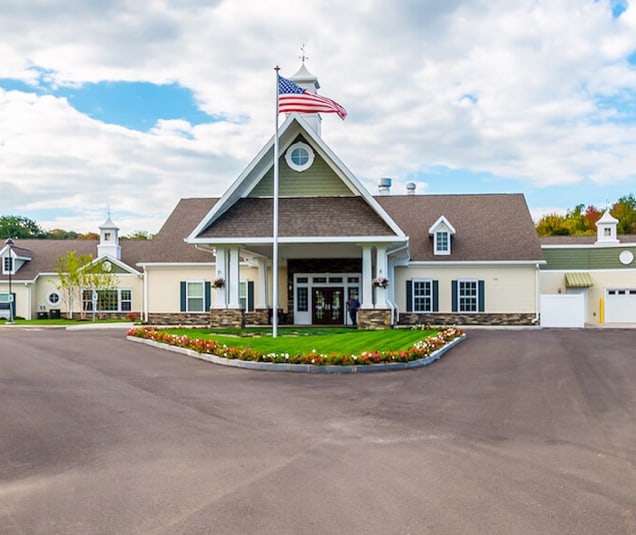Caregiving can be extremely rewarding. Not only does it give you a chance to strengthen your bond with your loved one, it also helps improve their quality of life. However, dementia often poses unique challenges for both caregivers and their loved ones. This sometimes leads people to wonder whether assisted living is available for people with dementia–and how they can get their loved ones professional care.
If a loved one is diagnosed with dementia, memory care can help. Memory care communities are designed specifically to help older adults living with dementia. These communities offer a team of experienced caregivers, provide a safe environment, and enable easy access to cognitive therapy and engaging activities. These advantages mean that a memory care-based community can offer your loved ones a new home that genuinely understands the challenges that they face every day.
What Is Memory Care?
Dementia can be a complicated condition. In fact, it can affect almost every facet of your loved one’s everyday life–including memory, communication capabilities, personality, and behavior.
Over time, dementia may lead to the need for advanced care. As the condition progresses, symptoms often begin to worsen, and it becomes increasingly challenging for your loved one to live at home. For instance, they may be at risk of harming themselves, or of wandering and getting lost. So, what do you do in such situations?
Cases like these are when it’s time to consider memory care, a specialized type of long-term senior care designed to meet the unique needs of individuals living with Alzheimer’s disease, dementia, and other types of memory impairments. With memory care, your loved one can live as part of a community that’s designed to support their everyday life as well as help them maintain their quality of life, their dignity, and their happiness.
How Memory Care Can Help
Unlike standard assisted living facilities, memory care communities provide an environment that focuses specifically on the safety, health, and well-being of individuals with memory loss. Some of the benefits include on-site caretakers, therapy programs designed to maintain cognitive abilities, and more.
Every part of these communities—from the physical environment to the teams on-site—caters to your loved one’s situation. Memory care offers:
- Specialized caregivers: Staff receive ongoing training, and have a deep understanding of the unique challenges faced by seniors living with dementia.
- Personalized care plans: Every resident receives a personalized care plan tailored to their specific needs, capabilities, mobility, and preferences.
- Safe and secure surroundings: These communities prioritize safety with secure exits and entrances to minimize wandering, a common concern for those with dementia.
- Engaging activities: Memory care communities offer stimulating activities designed to promote cognitive function and bring joy into everyday life..
- Emotional support: Memory care communities provide a supportive and understanding environment for both residents and caregivers, offering emotional support during a challenging time.
Memory care communities aren’t just about providing a place to live—they offer a home that truly understands what your loved one is going through. With memory care, your loved one can enjoy making the most of each and every day in an environment designed to help.
How to Tell if a Loved One Needs Memory Care
So how can you tell if a loved one needs memory care? It’s crucial to learn how to recognize the early signs of dementia so you can get your loved one the care they deserve.
Keep an eye out for the following signs:
- Memory problems, such as forgetting names, faces, or recent events
- Difficulty completing familiar tasks
- Challenges when trying to plan or solve problems
- Poor judgment, like making bad decisions or mismanaging money
- Withdrawal from social activities and hobbies that a person once enjoyed
- Changes in mood or personality, such as increased anxiety, confusion, or depression
- Trouble communicating, including forgetting words or someone repeating themselves frequently
These symptoms are more than an inconvenience. As they begin to progress, they’ll start to negatively affect a person’s quality of life, and even put them at risk of self-harm or getting lost. If you see these signs of cognitive decline and dementia in your loved ones, it’s time to talk about memory care.
How to Ease the Transition to Memory Care
Making a big change can be challenging at any stage in life. It’s always an emotional time when a loved one moves to memory care! Make sure that you’re being patient, understanding, and supportive; your loved one will need your assistance as they’re navigating this transition.

To make the transition easier, try to:
- Visit the community together beforehand. This can help your loved one familiarize themself with the new environment, which can do wonders for reducing anxiety.
- Encourage them to bring personal items. Surrounding your loved one with familiar items from their home, such as photographs, favorite blankets, or cherished keepsakes, can provide both comfort and a sense of continuity.
- Maintain open communication. Regularly discuss your loved one’s feelings and concerns about the move. Reassure them that their comfort and well-being are your top priorities.
- Stay involved. Visit often and participate in community events or activities with your loved one. Your presence can make the transition smoother and help them adjust more quickly.
Remember, transitioning to memory care is a significant step, but it’s one that can greatly enhance your loved one’s quality of life. With patience, love, and support, you can help them embrace this new chapter with confidence and peace.
Quality Care in Syracuse
Finding the right care for a loved one with dementia is crucial for their well-being and your peace of mind. If you have a loved one in need of memory care, contact our team here at Peregrine Senior Living! We’ll work closely with you to find the right community. Contact us today, and let’s work together to find your loved one a new home!












Today is National Compliment Day! It’s a reminder to share encouragement and appreciation freely. Remember, it costs nothing to be kind, but the impact of a thoughtful word can last a lifetime!
Tell a friend they make you smile. Thank a caregiver for their dedication. Compliment a resident on their sense of humor or style. 😁
We’ve seen how positivity strengthens bonds and brightens spirits. Let’s make today—and every day—a little kinder.
peregrineonondaga.com/ ... See MoreSee Less
0 CommentsComment on Facebook
Today, we honor the life and legacy of Dr. Martin Luther King Jr.—a leader whose message of equality, compassion, and courage continues to inspire us all.
His dream reminds us that even small acts of kindness can ripple outward and create lasting change.
May we carry his vision forward by leading with empathy, listening with understanding, and building communities grounded in love and unity.
peregrineonondaga.com/ ... See MoreSee Less
0 CommentsComment on Facebook
Lots of smiles today at Onondaga Hill with making our snowmen and adding some individual art to each one. Our residents enjoyed themselves with this Creative Craft and check out all of them on display on our fireplace mantel. ... See MoreSee Less
0 CommentsComment on Facebook
Lots of smiles from our community members and their family members this afternoon as we listened to the sweet sounds of Meg Mawhinney!! We also enjoyed some delicious snacks and the warmer weather. ... See MoreSee Less
3 CommentsComment on Facebook
A new year means new beginnings, and for many, that includes finding a place that feels like home. 🏠❤️
Our community offers the perfect blend of comfort, engagement, and care. Whether you’re looking for a vibrant social lifestyle or the peace of mind that comes from knowing support is always nearby, you’ll find it here.
Schedule your tour today and see how life at Peregrine can help you or your loved one thrive in 2026 and beyond!
peregrineonondaga.com/ ... See MoreSee Less
0 CommentsComment on Facebook
As we turn the page to a new year, we take a moment to reflect on the memories we’ve made and the friendships we’ve built. Every new beginning brings fresh opportunities for connection, growth, and joy. 💫
Here’s to a year filled with purpose, peace, and the beautiful moments that remind us how wonderful life can be.
Happy New Year from all of us at Peregrine! 🎆
peregrineonondaga.com/ ... See MoreSee Less
0 CommentsComment on Facebook
Community, collaboration, and care 💫
Loved spending time at our Constant Care 24/7 monthly meeting at Park Rose with some of our favorite partners, Peregrine Senior Living at Onondaga Hill , Aging Advocates CNY , and Living With Dementia CNY 💜 ... See MoreSee Less
0 CommentsComment on Facebook